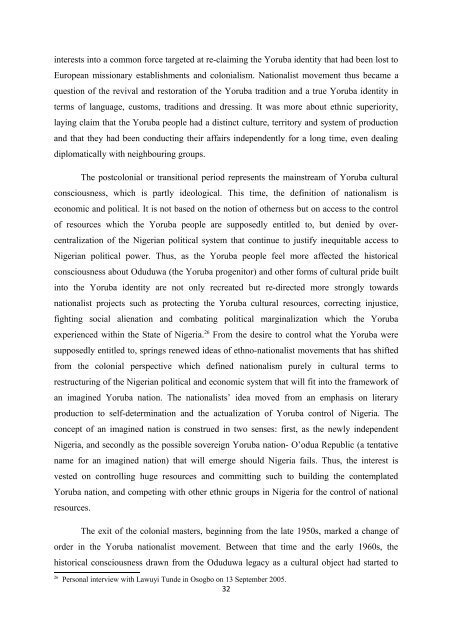The Yoruba Nationalist Movements, Ethnic Politics and Violence: A ...
The Yoruba Nationalist Movements, Ethnic Politics and Violence: A ...
The Yoruba Nationalist Movements, Ethnic Politics and Violence: A ...
Create successful ePaper yourself
Turn your PDF publications into a flip-book with our unique Google optimized e-Paper software.
interests into a common force targeted at re-claiming the <strong>Yoruba</strong> identity that had been lost to<br />
European missionary establishments <strong>and</strong> colonialism. <strong>Nationalist</strong> movement thus became a<br />
question of the revival <strong>and</strong> restoration of the <strong>Yoruba</strong> tradition <strong>and</strong> a true <strong>Yoruba</strong> identity in<br />
terms of language, customs, traditions <strong>and</strong> dressing. It was more about ethnic superiority,<br />
laying claim that the <strong>Yoruba</strong> people had a distinct culture, territory <strong>and</strong> system of production<br />
<strong>and</strong> that they had been conducting their affairs independently for a long time, even dealing<br />
diplomatically with neighbouring groups.<br />
<strong>The</strong> postcolonial or transitional period represents the mainstream of <strong>Yoruba</strong> cultural<br />
consciousness, which is partly ideological. This time, the definition of nationalism is<br />
economic <strong>and</strong> political. It is not based on the notion of otherness but on access to the control<br />
of resources which the <strong>Yoruba</strong> people are supposedly entitled to, but denied by overcentralization<br />
of the Nigerian political system that continue to justify inequitable access to<br />
Nigerian political power. Thus, as the <strong>Yoruba</strong> people feel more affected the historical<br />
consciousness about Oduduwa (the <strong>Yoruba</strong> progenitor) <strong>and</strong> other forms of cultural pride built<br />
into the <strong>Yoruba</strong> identity are not only recreated but re-directed more strongly towards<br />
nationalist projects such as protecting the <strong>Yoruba</strong> cultural resources, correcting injustice,<br />
fighting social alienation <strong>and</strong> combating political marginalization which the <strong>Yoruba</strong><br />
experienced within the State of Nigeria. 26 From the desire to control what the <strong>Yoruba</strong> were<br />
supposedly entitled to, springs renewed ideas of ethno-nationalist movements that has shifted<br />
from the colonial perspective which defined nationalism purely in cultural terms to<br />
restructuring of the Nigerian political <strong>and</strong> economic system that will fit into the framework of<br />
an imagined <strong>Yoruba</strong> nation. <strong>The</strong> nationalists’ idea moved from an emphasis on literary<br />
production to self-determination <strong>and</strong> the actualization of <strong>Yoruba</strong> control of Nigeria. <strong>The</strong><br />
concept of an imagined nation is construed in two senses: first, as the newly independent<br />
Nigeria, <strong>and</strong> secondly as the possible sovereign <strong>Yoruba</strong> nation- O’odua Republic (a tentative<br />
name for an imagined nation) that will emerge should Nigeria fails. Thus, the interest is<br />
vested on controlling huge resources <strong>and</strong> committing such to building the contemplated<br />
<strong>Yoruba</strong> nation, <strong>and</strong> competing with other ethnic groups in Nigeria for the control of national<br />
resources.<br />
<strong>The</strong> exit of the colonial masters, beginning from the late 1950s, marked a change of<br />
order in the <strong>Yoruba</strong> nationalist movement. Between that time <strong>and</strong> the early 1960s, the<br />
historical consciousness drawn from the Oduduwa legacy as a cultural object had started to<br />
26<br />
Personal interview with Lawuyi Tunde in Osogbo on 13 September 2005.<br />
32

















